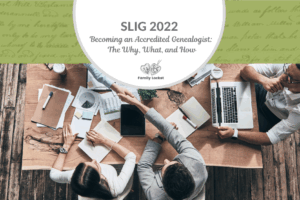I’m excited to announce that I’ll be coordinating Course 4 at the Texas Institute of Genealogical Research (TIGR) 2025, titled “Integrating AI into Genealogical Research and Writing.” This course will explore how genealogists can effectively harness artificial intelligence tools while maintaining high standards of quality in their research and writing. Each day will have a theme, like research or transcription. There will be daily homework options as well as a dedicated hands-on session for the last session of each day.
Claude.ai helped write this blog post.
About TIGR 2025
The Texas State Genealogical Society’s Texas Institute of Genealogical Research (TIGR) offers intensive, advanced-level courses for genealogists seeking to enhance their skills. The 2025 institute features multiple courses covering various aspects of genealogical research and methodology, with Course 4 focusing specifically on the integration of AI tools into genealogical practice.
Course Format and Dates
Course 4 will run from June 16-20, 2025, as a virtual institute featuring live lectures with daily Zoom Q&A sessions. This interactive format allows for real-time learning and engagement with instructors and fellow participants.
Who Should Attend?
This course is designed for intermediate to professional genealogists who want to:
- Learn practical applications of AI in genealogical workflows
- Increase efficiency in research and writing processes
- Understand how to ethically integrate AI tools while maintaining quality
- Develop strategies for using AI in various aspects of genealogical work
The course is limited to 40 participants to ensure individual attention and meaningful engagement.
Course Content
Throughout the week, we’ll cover a comprehensive range of topics that address the entire genealogical research and writing process:
Monday, June 16: Foundations and Planning
- AI Fundamentals and Responsibilities (Dyer)
- Objectives, Analysis, and Research Planning with AI (Elder)
- Enhancing Research Logs and Note-Taking with AI (Dyer)
- Writing and Formatting Citations with AI Assistance (Elder)
- Hands on: Genealogical Writing and AI (Dyer)
Tuesday, June 17: Transcription Methods
- Transkribus: Specialized Models for Multiple Languages and Time Periods (Dyer)
- Transcription Pearl: An AI Tool for Handwritten Documents (Humphries)
- Transcription with LLMs (Dyer)
- AI vs. Old German Script: What Works and What Doesn’t (Schober)
- Hands on: Creating Abstracts from Transcriptions with AI (Little)
Wednesday, June 18: Analysis and Evidence
- Analyzing Information and Extracting Evidence from Historical Documents with AI (McGhie)
- Locality Research and Creating a Locality Guide with AI (Thompson)
- DNA Evidence Analysis with AI (Dyer)
- Formatting Visual Data in Written Work with AI (Childs)
- Hands on: Understanding Meanings in Historical Documents; Extracting Data from Lengthy Sources with AI (Dyer)
Thursday, June 19: Writing and Style
- From AI to Authenticity: Disclosure Practices and Style Development (Dyer)
- AI Techniques to Enhance Your Case Study Writing (Joyce)
- Research Reports: Writing Efficiently with AI (Dyer)
- Using AI to Add Social and Historical Context to a Family Narrative (McGhie)
- Hands on: Editing Your Writing with AI (McGhie)
Friday, June 20: Case Studies and Integration
- Homework Review/Q&A (Elder)
- Weatherford Case Study: Writing with AI (Elder)
- Sally Keaton Proof Argument: Writing with AI (Dyer)
Meet Our Expert Faculty
Course 4 brings together a stellar faculty of experienced genealogists and AI specialists:
Nicole Elder Dyer, Coordinator As course coordinator, I’ll be teaching several classes and leading the homework discussions at the beginning of each day. My background includes creating and teaching the “Research Like a Pro” and “Research Like a Pro with DNA” methodology alongside my mother, Diana Elder, and teaching at many conferences and institutes. I’m a professional genealogist and project manager at Family Locket Genealogists.
Diana Elder, AG®, AGL® Diana is a professional genealogist accredited in the Gulf South region. She authored Research Like a Pro: A Genealogist’s Guide and co-authored Research Like a Pro with DNA. Diana regularly teaches at major genealogical conferences including RootsTech and the National Genealogical Society Conference, and hosts the Research Like a Pro Genealogy Podcast.
Alice Childs, AG® Alice is a professional genealogist accredited in the U.S. Mid-Atlantic region and serves as Assistant Director of the BYU Center for Family History and Genealogy. She shares family history resources through her GenealogyNow blog at alicechilds.com.
Jan Joyce, DBA, CG®, CGL™, AG® Jan holds multiple credentials in genealogy and developed the comprehensive “Assemblage” course for the Salt Lake Institute of Genealogy, guiding students through preparing, writing, and revising case studies. Her Document Work Workshop helps aspiring genealogists prepare for BCG certification.
Steve Little Steve serves as the Artificial Intelligence Program Director for the National Genealogical Society. With a background in applied linguistics specializing in natural language processing and computational linguistics, he brings expertise in both the technical and practical applications of AI in genealogy.
Angela Packer McGhie, CG®, FUGA Angela is Vice President of the Board for Certification of Genealogists and coordinates courses at several prestigious genealogical institutes. She served as administrator of the ProGen Study Program from 2008-2014 and has been recognized for her leadership in the field.
Katherine Schober, MA Katherine specializes in German genealogy and old German handwriting. She is the author of “The Magic of German Church Records” and “Tips and Tricks of Deciphering German Handwriting,” and creator of online courses on reading old German handwriting and German for genealogists.
Mark Thompson Mark is a professional genealogist specializing in applying AI to genealogy. As co-host of the Family History AI Show podcast, he helps genealogists bridge the gap between technology and family history research. He brings executive IT leadership experience to the rapidly evolving field of AI-assisted genealogy.
Mark Humphries, PhD Mark is a Professor in the Department of History at Wilfrid Laurier University with extensive experience in digital history and AI applications for historical research. He created Transcription Pearl, an innovative AI tool designed specifically for transcribing historical handwritten documents. Mark has also developed approaches for using AI to trace individuals across massive historical source bases and created some of the first certificate programs in Generative AI.
Prerequisites and Preparation
To get the most from this course, participants should:
- Create free accounts with major LLMs: Claude, ChatGPT, and Gemini (Perplexity is also recommended)
- Spend 5-10 hours learning about AI basics in genealogy through lectures, webinars, or articles
- Practice using AI for genealogical tasks for 10-15 hours
- Bring a 2-10 page sample of genealogical writing (research report, proof summary, family history, etc.)
Why This Course Matters
As artificial intelligence tools continue to evolve rapidly, genealogists face both opportunities and challenges. This course addresses the practical aspects of integrating AI into workflow while maintaining the high standards expected in quality genealogical research.
Rather than replacing the genealogist’s expertise, we’ll explore how AI can streamline time-consuming tasks like formatting, data extraction, transcription, and summarization—allowing more time for the complex research and writing decisions that require human judgment and expertise.
Registration Information
Registration for TIGR 2025 opens April 10, 2025. Seating is limited to 40 participants per course, so I recommend registering early to secure your spot in Course 4!
Registration Packages and Pricing
- Early Bird Rate (through April 30, 2025):
- TxSGS Members: $395
- Non-Members: $445
- Regular Rate (May 1-June 6, 2025):
- TxSGS Members: $445
- Non-Members: $495
Registration includes course instruction and a digital syllabus. TxSGS members receive discounted rates, so consider joining the society before registering if you’re not already a member. Go to https://www.txsgs.org/tigr-2025-registration/. Online registration closes June 6, 2025.
I hope to see you at TIGR 2025 for this exciting exploration of AI in genealogical research and writing!














2 Comments
Leave your reply.